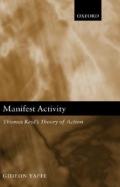Manifest Activity: Thomas Reid’s Theory of Action

Manifest Activity presents and critically examines Thomas Reid's doctrines about the model of human power, the will, our capacities for purposeful conduct, and the place of our agency in the natural world. Reid is one of the most important philosophers of the 18th century, but hitherto under-appreciated; through the reconstruction of his arguments, many of which have never before been discussed, Gideon Yaffe demonstrates that Reid's simple prose and direct style belie the complexity of the views he advocates and the subtlety of the reasons he offers in their favor. For Reid, contrary to the view of many of his predecessors, it is simply manifest that we are active with respect to our behaviors; it is manifest, he thinks, that our actions are not merely remote products of forces that lie outside of our control. Reid holds, instead, that actions are all and only those events that spring from active power, and he produces insightful and imaginative arguments for the claim that only a creature with a mind is capable of having active power. He believes that only human beings, and creatures "above us", are capable of directing events towards ends, of endowing them with purpose or direction, the distinctive feature of action. However, he also holds that all events, and not merely human actions, are products of active power, power possessed either by human beings or by God. This collection of theses leads Reid to the view that human behavior and the progress of nature are both essentially teleological. Patterns in nature are the products of laws of which God is the author; patterns in human conduct are the products of character and the laws that individuals set for themselves. Manifest Activity examines Reid's arguments for this view and the view's implications for the nature of character, motivation, and the special kind of causation involved in the production of human behavior. Yaffe's assessment will greatly profit anyone working on current theories of action and free will, as well as historians of ideas.